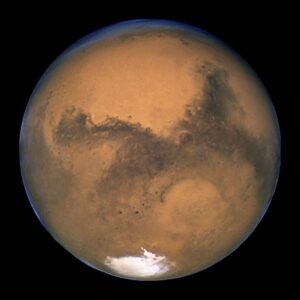Holst, The Planets (Mars)
 The last few weeks have taken us through some rather vivid and dramatic music: Strauss, Copland, Sousa, and even The Magnificent Seven. This week continues along those lines with the rousing tone poem The Planets by Gustav Holst. Very early in this series we featured the movement Jupiter, The Bringer of Jollity, and now we have Mars, The Bringer of War.
The last few weeks have taken us through some rather vivid and dramatic music: Strauss, Copland, Sousa, and even The Magnificent Seven. This week continues along those lines with the rousing tone poem The Planets by Gustav Holst. Very early in this series we featured the movement Jupiter, The Bringer of Jollity, and now we have Mars, The Bringer of War.
So what’s up with all this sound and fury? I have been creating a listening list aimed especially at boys. I call it, unimaginatively, Music for Boys. It consists almost entirely of previous Friday Performance Picks, but there are some works I wanted to get on this list that had not yet appeared here.
With Mars, the list is now complete with one exception for which I have not found a suitable performance yet. So expect something completely different next week.
Holst builds Mars on an underlying metrical pulse in 5. (If you’re ever looking for an example of 5/4 time, this is a good one.) The slow middle section switches to 5/2. But Holst layers contrasting rhythmic groupings on top of this pulse: an accompanying ostinato rhythm with an opening triplet (you’ll hear it from the first measure) and thematic material often in groups of two (dotted quarter and eighth, e.g. at 1:22) that stretch the rhythmic pattern into groups of 10 (because, you know, 5 is not evenly divisible by 2). You get the militaristic feel of a march, but whereas a typical march falls into neat 2-beat boxes, Mars feels seamless with a much longer dramatic arch. You might want to get the score and follow along.
Although Jupiter and Mars are filled with excitement, other “planets” exhibit very different moods. (Boys will find them interesting as well.) Venus follows Mars with soothing themes featuring a solo violin, for example, and Neptune presents vagueness and mysticism. And there’s more excitement to be found in other movements. The moods have little or nothing to do with the actual physical features of the planets, but rather the mythical stories associated with them.
Whether performed individually or as the complete suite, Holst’s work has been a perennial favorite with audiences. It has shaped our musical conception of outer space and influenced numerous film soundtracks dealing with the theme of space.




Professor Carol, are you aware of the book (dissertation) of Michael Ward “The Seven Heavens in the Imagination of C.S. Lewis,” Oxford University Press, 2008. A popularization of this scholarly work by Michael is “The Narnia Code: C.S. Lewis and the secret of the Seven Heavens,” Tyndale house publishers, 2010. The “Seven Heavens” are the seven “planets” in the Medieval cosmos: Jupiter, Mars, Sun, Moon, Mercury, Venus, Saturn. These are, of course, corresponding with the seven chapters in C.S. Lewis’ famous book for “children of all ages”: “The Narnia Chronicles.” Now there is a story to tell!
Cornelis, correct me if I’m wrong. (I read and loved The Narnia Code, too.) Didn’t it mention that Lewis was familiar with Holst’s “Planets?” Or am I disremembering?